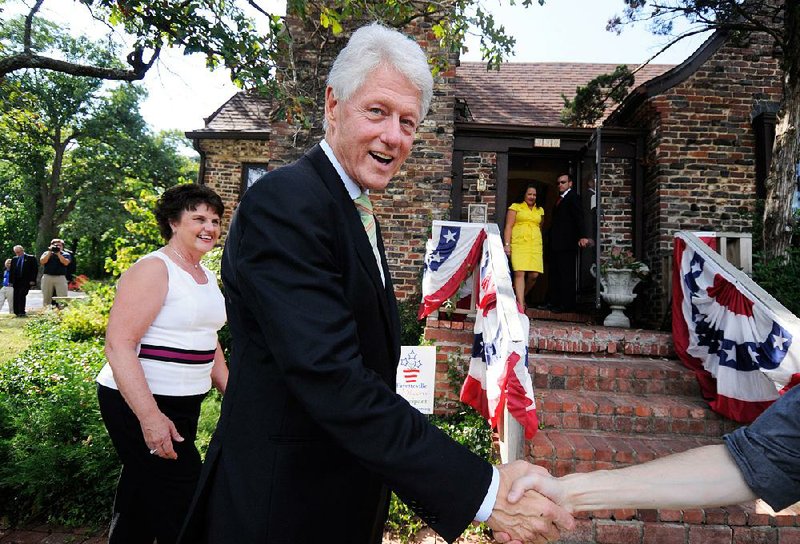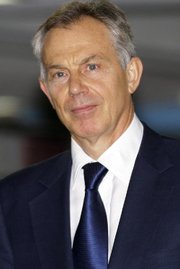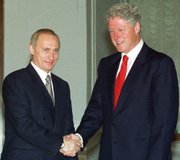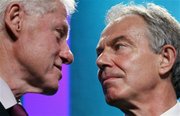Fifteen years almost to the day since President Bill Clinton left office, a newly released batch of documents from his library offers a fresh look at his later years in the White House, underscoring the close relationship between Clinton and former British Prime Minister Tony Blair.
RELATED ARTICLE
http://www.arkansas…">A week late, Clinton emails released
Clinton thought George W. Bush was perpetrating "a fraud" on America as a presidential candidate, Vladimir Putin had "enormous potential," and the people of Wyoming would be "shooting at me" if he visited. Clinton also confided in Blair about his worries for Princess Diana's sons after her death.
The transcribed phone calls and meetings released by the Clinton Presidential Center offer personal exchanges, including one on Sept. 1, 1997, the day after Diana's death in an automobile accident. Blair says that "it's like a star falling," while Clinton offers his fears for William and Harry, saying that "I worry a lot about those kids now."
He railed about "reactionaries in Congress," ruled out assassinating Saddam Hussein or Slobodan Milosevic and fretted about becoming "a meandering old man." At one point, he felt so beaten up by world events that he jokingly suggested becoming a British citizen.
The 500 pages obtained through a BBC Freedom of Information request are heavily redacted, and some substantive comments are blacked out.
The phone calls with Blair, from May 1, 1997, to Dec. 13, 2000, cover the period when scandal led to Clinton's impeachment by the House and acquittal by the Senate, but there is little hint of that in their conversations.
At one point in 1998, Clinton mentioned that he had just made a speech in Massachusetts. He did not note that it was part of his effort to apologize to the nation for not telling the truth about his affair with Monica Lewinsky, a young White House aide.
"This is my best state," Clinton said of Massachusetts on Aug. 27, 1998. "You know, if I'd been in Wyoming, they probably would have been shooting at me."
With bluntness and a smattering of R-rated language, the private conversations reveal a president sometimes unseen by the general public, one who veered from discussions of the Northern Ireland peace process to serrated assessments of his American political opposition. Like a time capsule, the transcripts capture the priorities and perceptions of the moment that, judged with the certainty of hindsight, look alternately prescient or wildly off base.
In one transcript, the two discuss Saddam, and Clinton warns Blair that Iraq could "become a real nightmare" for him.
"I think if we say to this guy 'If you start to comply, we will lift sanctions', he will quickly re-establish the weapons of mass destruction program, and it will become known in two years that he has," Clinton said. "It may not happen while I'm in office, but it will for you. It could become a real nightmare for you."
The close bond between the two men is shown as they discuss Blair's family. Clinton joked just before he was leaving office that he will be available for babysitting duties for Blair and his wife, Cherie Blair's, fourth child, Leo.
"I could do with a bit of help, I tell you," Blair told Clinton. "Cherie is in great form but just keeps getting bigger and bigger. I tell you, just the thought and I feel as if my life's about to begin again."
The transcripts also contain conversations that take unusual twists, including one chat in which Clinton reports that Vice President Al Gore told him that, when he visited British Deputy Prime Minister John Prescott's office, the only decoration in the room was a bowl of bananas.
"My staff won't let me talk to you unless I have a banana at hand. I'm sitting here with a banana; it's a big, ugly, brownish one," Clinton said.
Blair quickly strives to change the subject.
"Now Bill, I thought we should have a word about Kosovo."
Putin 'thoughtful'
They discussed the 2000 presidential election repeatedly, and the departing president expressed a mix of scorn and professional respect for Bush's performance against Republican rivals such as Sen. John McCain and Gore, the Democratic nominee.
"One reason Bush is doing so well is because he criticized one thing on the right," Clinton said on Oct. 13, 1999, days after Bush chided his party for budget cuts that hurt the poor. "He is making people think he is saving them from the right. But it's a fraud because he is really for them on everything else. I have to figure out how to expose the fraud that Bush is the new Clinton, establishing a new Republican Party like I made a Democratic Party. It's helping Bush but it is killing Al."
Many of the conversations between Clinton and Blair centered on Northern Ireland, where the president was trying to help broker peace. But they also provide a deeper portrait of Clinton as a commander in chief during a multiday bombing attack on Saddam's Iraq in 1998 and the Kosovo war against Milosevic's Serbia in 1999.
In both cases, Clinton sent messages through intermediaries that he would not take out the authoritarian leaders if they would just back down.
"I told him to go to Saddam, call him and tell him that I have no interest in killing him or hunting him down," Clinton said at one point, referring apparently to another Middle East leader. "I'm not fooling with him. I just don't want his chemical and biological program going forward."
Clinton expressed frustration that he could not negotiate with Saddam directly. "If I weren't constrained by the press, I would pick up the phone and call the son of a b****," he said. "But that is such a heavy-laden decision in America. I can't do that and I don't think you can."
During the air war to protect Kosovo from Milosevic's Serb forces, Clinton similarly sounded open to a deal that would leave him in power. He remained leery of sending ground troops despite pressure at home, in part because it would exacerbate the rising tensions with Moscow, which was aligned with Serbia. "If it comes to a troop option, what the hell are we going to do with Russia if it leads to the collapse of our relationship?" he asked.
Russia is one area where Clinton made judgments he would not embrace today, ones reminiscent of those made by Bush later on. "Putin has enormous potential, I think," Clinton said after the emergence of the new Russian leader. "I think he's very smart and thoughtful. I think we can do a lot of good with him."
At another point, Clinton said, "His intentions are generally honorable and straightforward, but he just hasn't made up his mind yet. He could get squishy on democracy."
Information for this article was contributed by Danica Kirka of The Associated Press and by Peter Baker of The New York Times.
A Section on 01/09/2016




